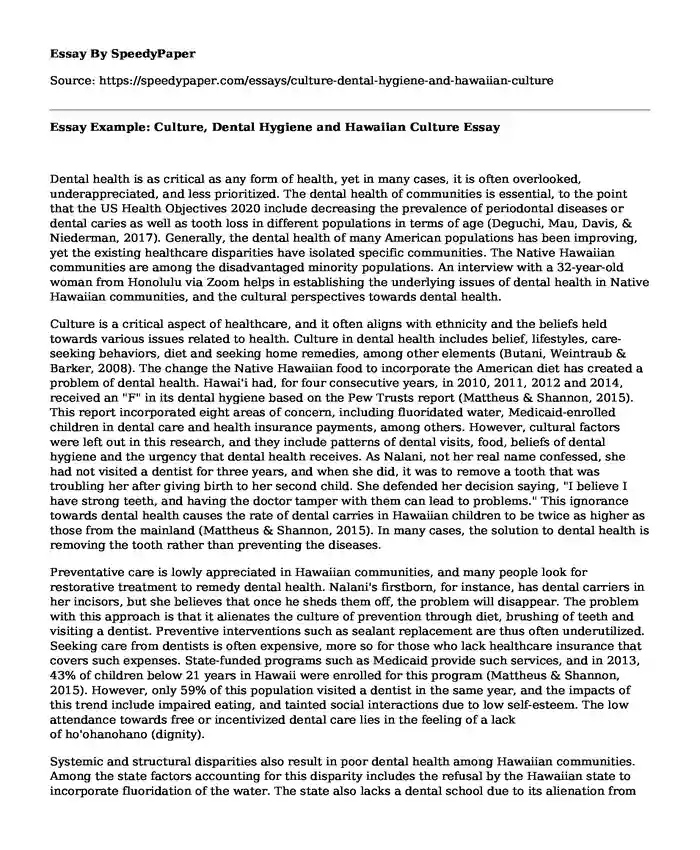
| Essay type: | Persuasive essays |
| Categories: | Culture Dentistry World Community health |
| Pages: | 3 |
| Wordcount: | 796 words |
Dental health is as critical as any form of health, yet in many cases, it is often overlooked, underappreciated, and less prioritized. The dental health of communities is essential, to the point that the US Health Objectives 2020 include decreasing the prevalence of periodontal diseases or dental caries as well as tooth loss in different populations in terms of age (Deguchi, Mau, Davis, & Niederman, 2017). Generally, the dental health of many American populations has been improving, yet the existing healthcare disparities have isolated specific communities. The Native Hawaiian communities are among the disadvantaged minority populations. An interview with a 32-year-old woman from Honolulu via Zoom helps in establishing the underlying issues of dental health in Native Hawaiian communities, and the cultural perspectives towards dental health.
Culture is a critical aspect of healthcare, and it often aligns with ethnicity and the beliefs held towards various issues related to health. Culture in dental health includes belief, lifestyles, care-seeking behaviors, diet and seeking home remedies, among other elements (Butani, Weintraub & Barker, 2008). The change the Native Hawaiian food to incorporate the American diet has created a problem of dental health. Hawai'i had, for four consecutive years, in 2010, 2011, 2012 and 2014, received an "F" in its dental hygiene based on the Pew Trusts report (Mattheus & Shannon, 2015). This report incorporated eight areas of concern, including fluoridated water, Medicaid-enrolled children in dental care and health insurance payments, among others. However, cultural factors were left out in this research, and they include patterns of dental visits, food, beliefs of dental hygiene and the urgency that dental health receives. As Nalani, not her real name confessed, she had not visited a dentist for three years, and when she did, it was to remove a tooth that was troubling her after giving birth to her second child. She defended her decision saying, "I believe I have strong teeth, and having the doctor tamper with them can lead to problems." This ignorance towards dental health causes the rate of dental carries in Hawaiian children to be twice as higher as those from the mainland (Mattheus & Shannon, 2015). In many cases, the solution to dental health is removing the tooth rather than preventing the diseases.
Preventative care is lowly appreciated in Hawaiian communities, and many people look for restorative treatment to remedy dental health. Nalani's firstborn, for instance, has dental carriers in her incisors, but she believes that once he sheds them off, the problem will disappear. The problem with this approach is that it alienates the culture of prevention through diet, brushing of teeth and visiting a dentist. Preventive interventions such as sealant replacement are thus often underutilized. Seeking care from dentists is often expensive, more so for those who lack healthcare insurance that covers such expenses. State-funded programs such as Medicaid provide such services, and in 2013, 43% of children below 21 years in Hawaii were enrolled for this program (Mattheus & Shannon, 2015). However, only 59% of this population visited a dentist in the same year, and the impacts of this trend include impaired eating, and tainted social interactions due to low self-esteem. The low attendance towards free or incentivized dental care lies in the feeling of a lack of ho'ohanohano (dignity).
Systemic and structural disparities also result in poor dental health among Hawaiian communities. Among the state factors accounting for this disparity includes the refusal by the Hawaiian state to incorporate fluoridation of the water. The state also lacks a dental school due to its alienation from mainland America, and this limits the dental knowledge of the community (Mattheus & Shannon, 2015). Budgetary strains caused the state to disband the Oral Health Branch of the Department of Health (DOH) in 2009, and this further created the disparities seen in dental health. These trends of neglect and financial constraints have limited access to dental health and created sources of more infections through the lack of fluoridated water.
Treating this community of dental health issues would require a culturally competent methodology that approaches the issues from the cultural point of view. For instance, instead of offering dental clinics, it would be critical first to educate the community of the importance of dental health, and urge them to utilize any chances, whether free of incentivized to improve their dental health.
References
Butani, Y., Weintraub, J. A. & Barker, J. C. (2008). Oral health-related cultural beliefs for four racial/ethnic groups: Assessment of the literature. BMC Oral Health 8 (26). https://doi.org/10.1186/1472-6831-8-26
Deguchi, M., Mau, M., Davis, J., & Niederman, R. (2017). Preventable Tooth Loss in Hawai'i: The Role of Socioeconomic Status, Diabetes, and Dental Visits. Preventing chronic disease, 14, E115. https://doi.org/10.5888/pcd14.170214
Mattheus D., & Shannon M (2015). Oral Health Outcomes for Children in Hawaii: Not Much to Smile About. Journal of Dental Problems and Solutions 2(3), Pp.034-037. DOI: 10.17352/2394-8418.000014
Cite this page
Essay Example: Culture, Dental Hygiene and Hawaiian Culture. (2023, Aug 30). Retrieved from https://speedypaper.net/essays/culture-dental-hygiene-and-hawaiian-culture
Request Removal
If you are the original author of this essay and no longer wish to have it published on the SpeedyPaper website, please click below to request its removal:
- Abortion Research Paper Samples
- Free Essay Sample on International Law
- Free Essay Dedicated to Managing Diversity in a Global Workplace
- Free Essay on Meditation and Wellness in Society
- Essay Sample on The Current State of Tourism in Western Australia
- Administering Medication Safety: Nurses' Key Role in Establishing Patient Safety - Essay Sample
- Free Paper Sample on Effectiveness of Change
Popular categories




